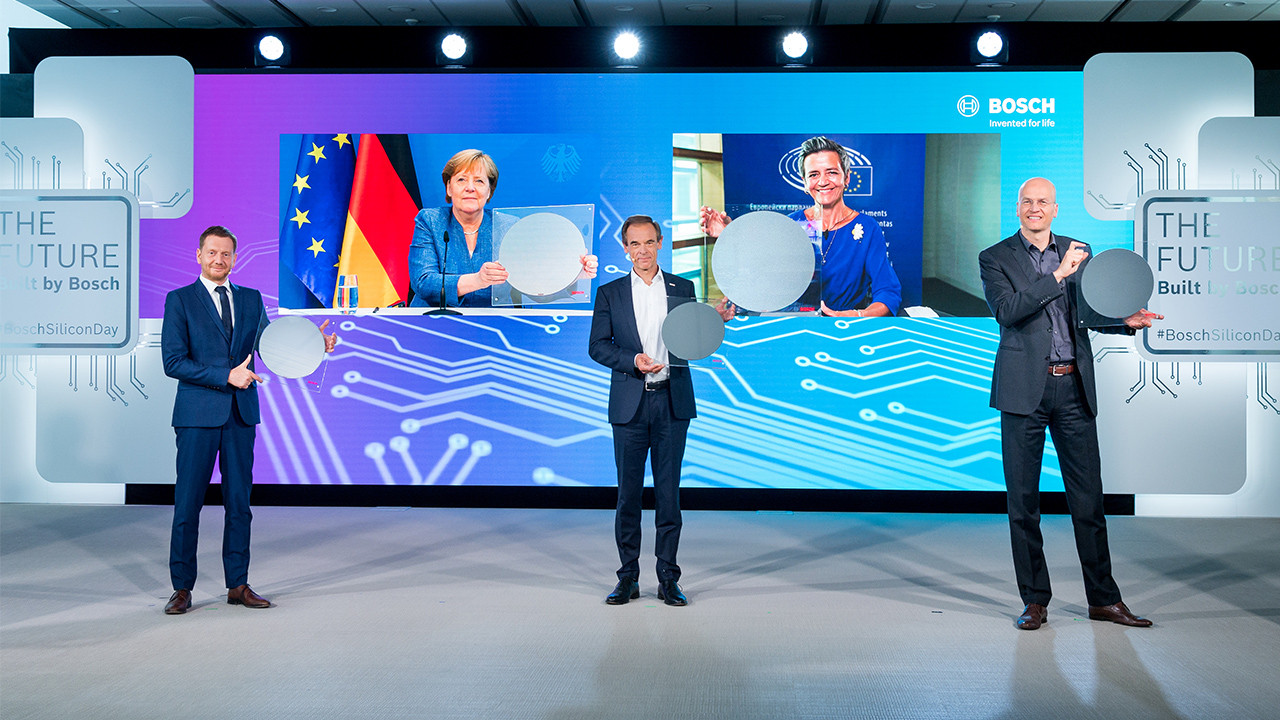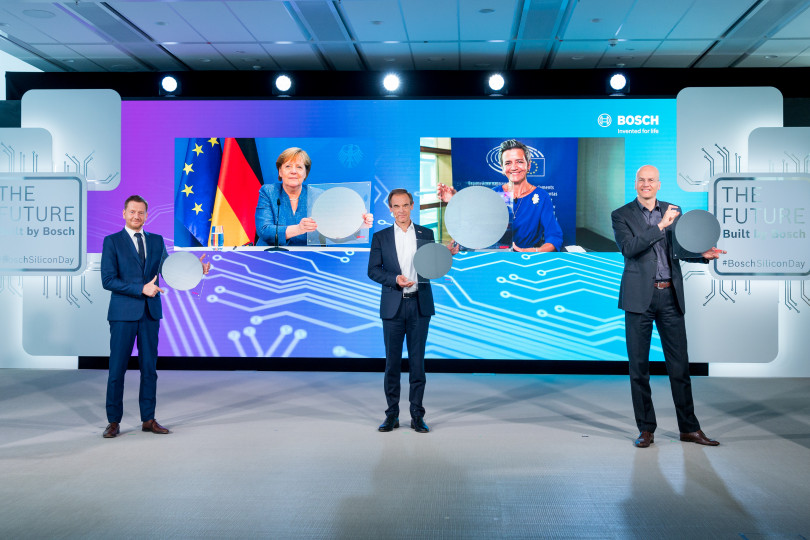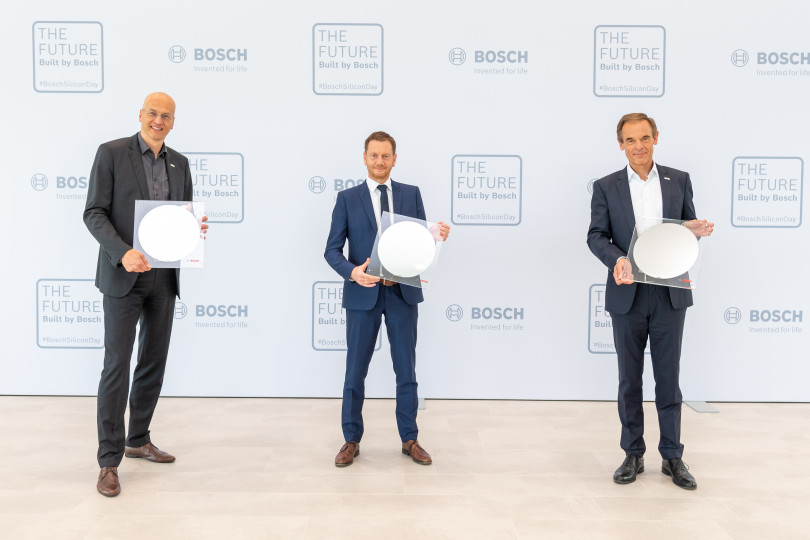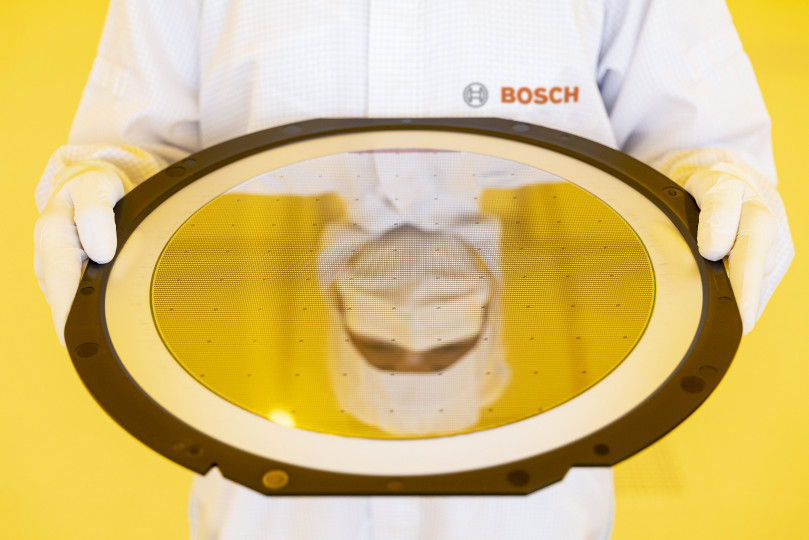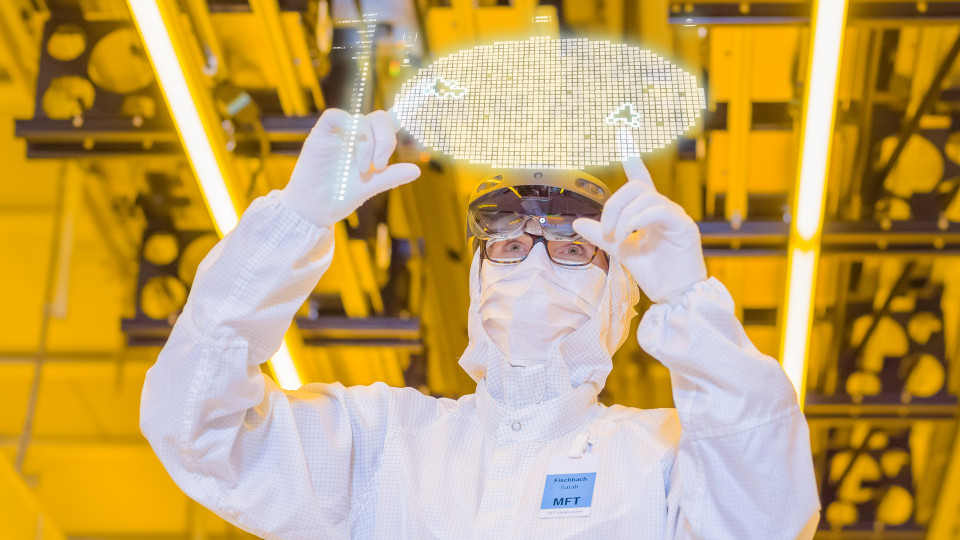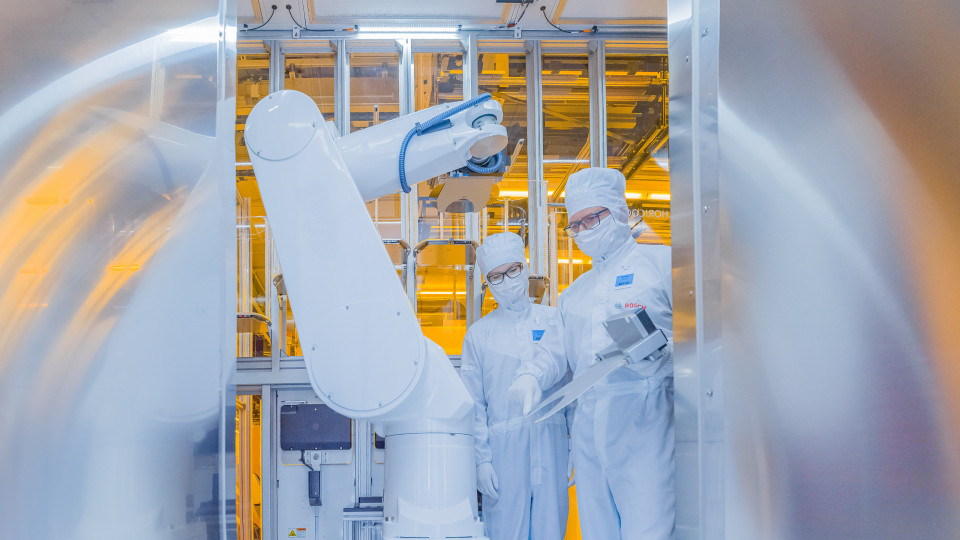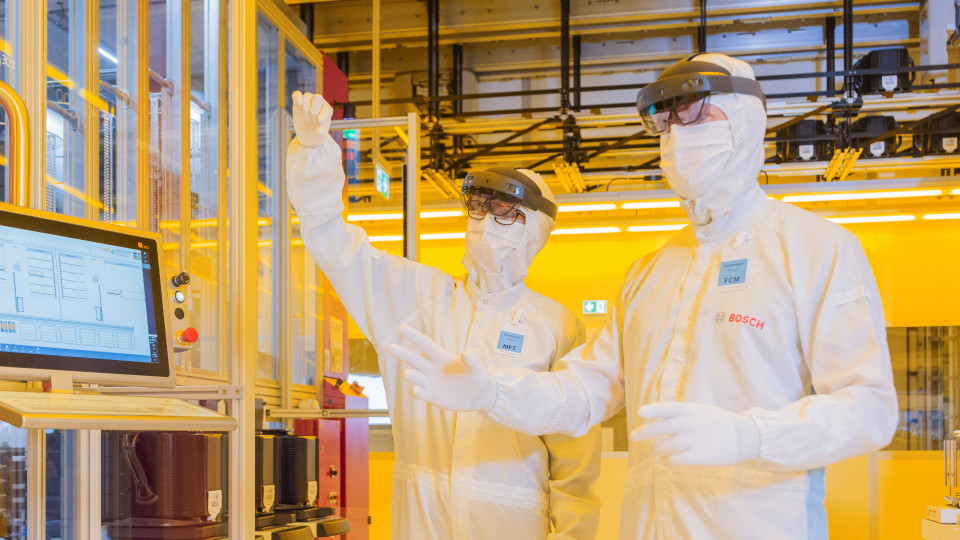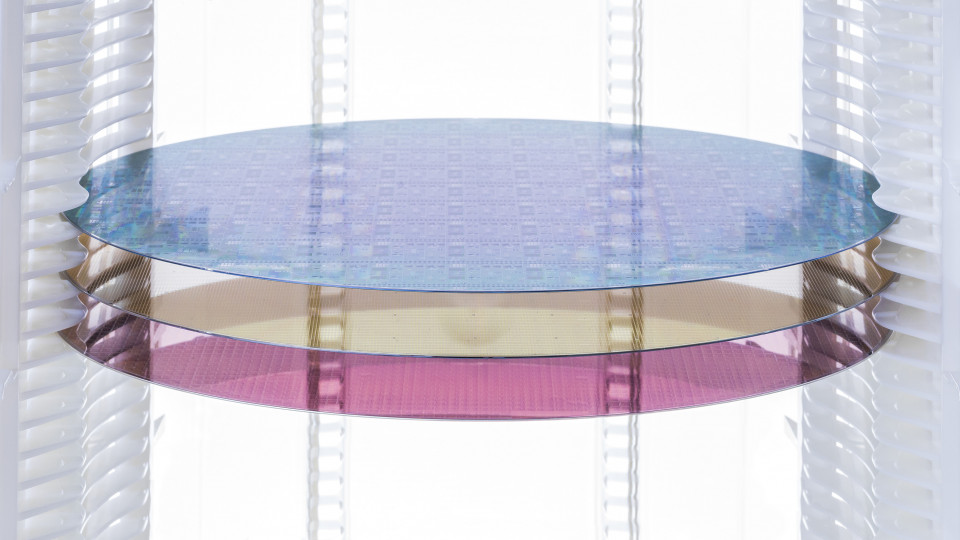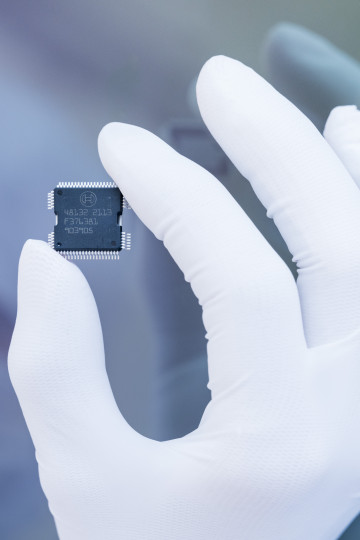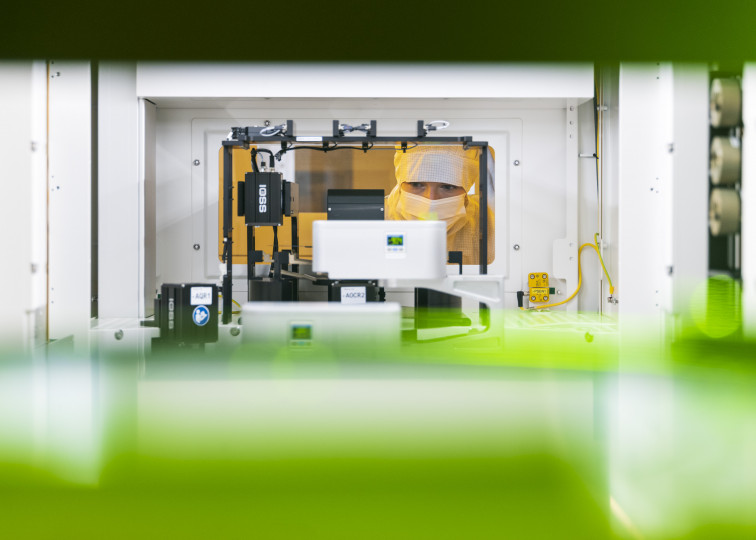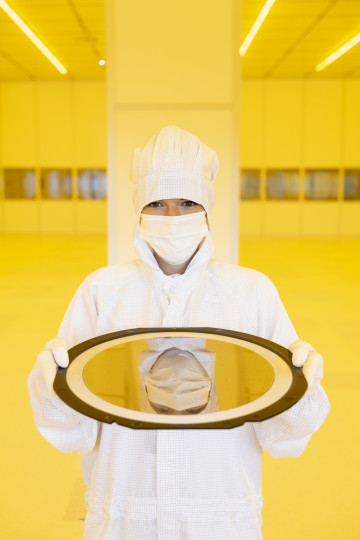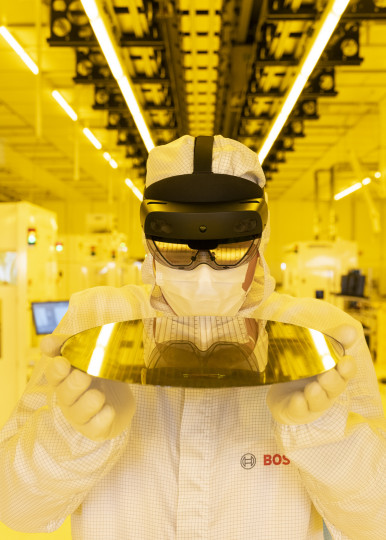Dresden, Germany – Fully connected, data-driven, self-optimizing: in Dresden, Bosch is opening one of the world’s most modern wafer fabs. Highly automated, fully connected machines and integrated processes, combined with methods of artificial intelligence (AI) will make the Dresden plant a smart factory and a trailblazer in Industry 4.0. In the virtual presence of Federal Chancellor Dr. Angela Merkel, EU Commission Vice-President Margrethe Vestager, and Saxony’s Minister-President Michael Kretschmer, the high-tech facility was officially inaugurated on June 7, 2021.
“The state-of-the-art technology showcased at the new Dresden wafer fab is a great example of what public and private European actors can achieve when they join their efforts. Semiconductors will contribute to the development of industries like transportation, manufacturing, clean energy, and healthcare – where Europe excels. It will help strengthen Europe’s competitiveness as a cradle for cutting-edge innovations,” said Margrethe Vestager, EU Commission Vice-President.
“For Bosch, semiconductors are a core technology, and it is strategically important to develop and manufacture them ourselves. In Dresden, with the help of artificial intelligence, we will take semiconductor manufacturing to the next level,” said Dr. Volkmar Denner, chairman of the board of management of Robert Bosch GmbH. “This is our first AIoT factory: fully connected, data-driven, and self-optimizing right from the start.” Bosch is investing roughly one billion euros in this high-tech location. This is the biggest single investment in the company’s more than 130-year history. Production in Dresden will start as early as July – six months earlier than planned. From that time on, semiconductors made in the new plant will be installed in Bosch power tools. For automotive customers, chip production will start in September, and thus three months earlier than planned. The new factory will be an important part of the semiconductor manufacturing network. With it, Bosch is strengthening Germany’s position as a technology and business location. “The new wafer fab is good for Europe, for Germany, and for Saxony. Directly and indirectly, it means many new jobs in a huge growth industry. This billion-euro investment strengthens Silicon Saxony and the entire European semiconductor industry,” said Michael Kretschmer, the minister-president of Saxony. On 72,000 square meters of floor space, 250 people are already working in the wafer fab in Saxony’s state capital. The workforce is set to grow to roughly 700 once construction work has been completed.
No other automotive supplier has been working intensively on microelectronics since the 1950s. Since 1958, Bosch has been making semiconductor components itself. And since 1970, the company’s Reutlingen plant has been making special components that are not commercially available. In its wafer fabs in Reutlingen and Dresden alone, Bosch has invested more than 2.5 billion euros since 200-millimeter technology was introduced in 2010. On top of this, billions of euros have been invested in developing microelectronics. In this way, the company is continuing to pursue its growth strategy in semiconductor development and manufacturing. “This expertise is the key to many high-caliber systems solutions made by Bosch,” Denner said.
Pioneer in Industry 4.0
Machines that think for themselves, maintenance work from 9,000 kilometers away, glasses with built-in cameras: the wafer fab that has now been built in Dresden is one of the world’s most advanced. “Thanks to the combination of artificial intelligence and the internet of things, we are creating the basis for data-driven, continuous improvement in manufacturing,” Denner said. In concrete terms, this means that all the data in the wafer fab – from machinery, sensors, and products – is collected in a central database. The result: every second, production data equivalent to 500 pages of text is generated. In just one day, this would be equivalent to more than 42 million pages. This data is then evaluated using methods of artificial intelligence. In this process, self-optimizing algorithms learn how to make predictions on the basis of the data. In this way, manufacturing and maintenance processes can be analyzed in real time. For example, an AI algorithm can detect even the tiniest anomalies in products. These anomalies are visible on the wafer surface in the form of specific error patterns known as signatures. Their causes are immediately analyzed and deviations from the process corrected without delay, even before they can affect the reliability of the product. “Artificial intelligence is the key to further improving the manufacturing processes and semiconductor quality, as well as to achieving a high level of process stability.” Denner said. In turn, it means that semiconductor products can go into full-scale production quickly, saving automotive customers the need for the time-consuming trials that would otherwise be necessary before production release. Maintenance work can also be optimized thanks to artificial intelligence. Algorithms can precisely predict whether and when a piece of manufacturing machinery or a robot needs maintenance or adjustment. In other words, such work is not done according to a rigid schedule, but precisely when it is needed – and well in advance of any problems cropping up.
“Digital twin”: the plant and its double
One other outstanding feature of the wafer fab is that it exists twice – once in the real world, and once in the digital world. The specialist term for this is “digital twin.” During construction, all parts of the factory and all relevant construction data relating to the plant as a whole were recorded digitally and visualized in a three-dimensional model. The twin comprises roughly half a million 3D objects, including buildings and infrastructure, supply and disposal systems, cable ducts and ventilation systems, and machinery and manufacturing lines. This allows Bosch to simulate both process optimization plans and renovation work without intervening in ongoing operations. Maintenance work in the Dresden factory also makes use of high-tech: data glasses and augmented reality mean that maintenance work on machinery can even be done remotely. In other words, maintenance work in Dresden can be done by an expert from a mechanical engineering company in Asia without any need for that expert to come to Dresden. Thanks to a camera built into data glasses, images are transmitted half way around the world, and the expert there then talks the associate through the maintenance process in real time. This technology also played a crucial role in ensuring that the machinery could be commissioned despite coronavirus-related travel restrictions.
Semiconductors for better quality of life and road safety
In the shape of microchips, semiconductors are to be found in nearly every technical device – in smartphone, televisions, and fitness bracelets. And without semiconductors, cars would not work, either today or in the future. In 2016, every new vehicle worldwide had an average of more than nine Bosch chips on board, in devices such as the airbag control unit, the braking system, and the park assist system. In 2019, this figure was already more than 17. In other words, their number had nearly doubled in just a few years. In the years to come, experts expect to see the strongest growth in driver assistance systems, infotainment, and the electrification of the powertrain. With its wafer fab in Dresden, Bosch is responding to the increased demand for semiconductors. “Semiconductors are the building blocks of progress. Electronic components equipped with chips from Dresden will make applications such as automated and resource-conserving driving possible, as well as the best possible occupant protection,” said Harald Kroeger, member of the board of management of Robert Bosch GmbH. Surveys confirm this growth in demand: as recently as 1998, according to the ZVEI, the value of the microelectronics in a new car was 120 euros. By 2018, this value had risen to 500 euros, and in 2023 it is expected to exceed 600 euros. This means that semiconductors are a growth area for Bosch as well.
Semiconductor expertise as a competitive advantage
“Chips for vehicles are the ultimate discipline in semiconductor technology. This is because in cars, these small building blocks have to be especially robust,” Kroeger said. Over a vehicle’s service life, chips are exposed to strong vibrations and extreme temperatures that range from far below freezing to far above the boiling point of water. In other words, chips have to meet higher standards of reliability. This means that the development of automotive semiconductors is more complicated than in other applications. This requires specialist expertise, and Bosch has amassed such expertise over the course of decades. Its developers and engineers understand the physical principles behind microelectronic automotive components. This opens up the possibility of complete systems that prevent accidents and protect the environment – again, the company is a one-stop shop for the development and manufacture of such systems. “This dual strength – the combination of chip and systems expertise – is strategically important for Bosch,” Kroeger said. In addition, Bosch can complement its strength in the development and manufacture of semiconductors with its systems expertise in electronics and software. This allows the company to ensure the quality of its products, to continuously refine them, and to reduce costs.
“Silicon Saxony”: Europe’s biggest microelectronics location
After comparing sites around the world, Bosch settled on Dresden, in the state of Saxony, as the location for its wafer fab. “Silicon Saxony” is Europe’s biggest microelectronics location, and the fifth biggest worldwide. One in three of all chips made in Europe is produced here. The region offers perfect conditions for this. “The location and construction of the factory demonstrate how much faith people have in Saxony as a high-tech location, with its experienced and qualified specialists and an unrivalled network that has come into being here over the course of the decades,” said Michael Kretschmer, Saxony’s minister-president. He added that Dresden’s infrastructure is excellent: everything is easily accessible, and the transportation connections are good. This includes companies from the automotive supply, services, and other industries, as well as universities and research institutes offering technological expertise. “In Dresden, modern entrepreneurship rubs shoulders with academic excellence and far-sighted industrial policy,” Kroeger said. “For Bosch therefore, the decision to make the single biggest investment in the company’s more than 130-year history here in this region was a deliberate one.”
Mónika Hack
+36 70 510 5516
Mobility Solutions is the largest Bosch Group business sector. It generated sales of 42.1 billion euros in 2020, and thus contributed 59 percent of total sales from operations. This makes the Bosch Group one of the leading automotive suppliers. The Mobility Solutions business sector pursues a vision of mobility that is safe, sustainable, and exciting, and combines the group’s expertise in the domains of personalization, automation, electrification, and connectivity. For its customers, the outcome is integrated mobility solutions. The business sector’s main areas of activity are injection technology and powertrain peripherals for internal-combustion engines, diverse solutions for powertrain electrification, vehicle safety systems, driver-assistance and automated functions, technology for user-friendly infotainment as well as vehicle-to-vehicle and vehicle-to-infrastructure communication, repair-shop concepts, and technology and services for the automotive aftermarket. Bosch is synonymous with important automotive innovations, such as electronic engine management, the ESP anti-skid system, and common-rail diesel technology.
The Bosch Group is a leading global supplier of technology and services. It employs roughly 395,000 associates worldwide (as of December 31, 2020). The company generated sales of 71.5 billion euros in 2020. Its operations are divided into four business sectors: Mobility Solutions, Industrial Technology, Consumer Goods, and Energy and Building Technology. As a leading IoT provider, Bosch offers innovative solutions for smart homes, Industry 4.0, and connected mobility. Bosch is pursuing a vision of mobility that is sustainable, safe, and exciting. It uses its expertise in sensor technology, software, and services, as well as its own IoT cloud, to offer its customers connected, cross-domain solutions from a single source. The Bosch Group’s strategic objective is to facilitate connected living with products and solutions that either contain artificial intelligence (AI) or have been developed or manufactured with its help. Bosch improves quality of life worldwide with products and services that are innovative and spark enthusiasm. In short, Bosch creates technology that is “Invented for life.” The Bosch Group comprises Robert Bosch GmbH and its roughly 440 subsidiary and regional companies in some 60 countries. Including sales and service partners, Bosch’s global manufacturing, engineering, and sales network covers nearly every country in the world. With its more than 400 locations worldwide, the Bosch Group has been carbon neutral since the first quarter of 2020. The basis for the company’s future growth is its innovative strength. At 129 locations across the globe, Bosch employs some 73,000 associates in research and development, of which nearly 34,000 are software engineers.
Additional information is available online at www.bosch.hu, iot.boschblog.hu, www.bosch.com, www.iot.bosch.com, www.bosch-press.com, http://www.twitter.com/BoschPress.

